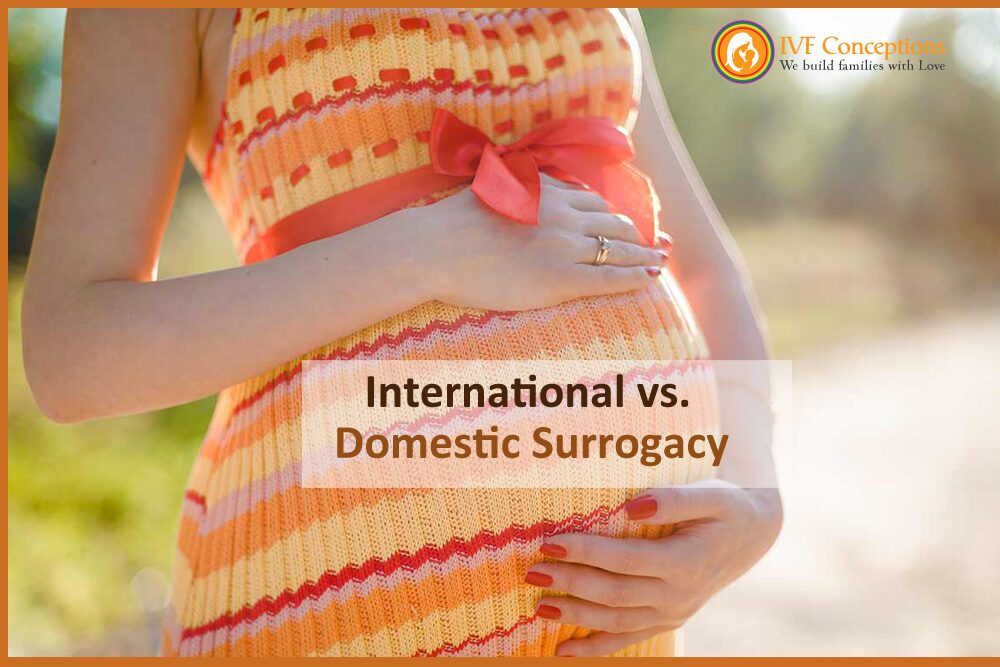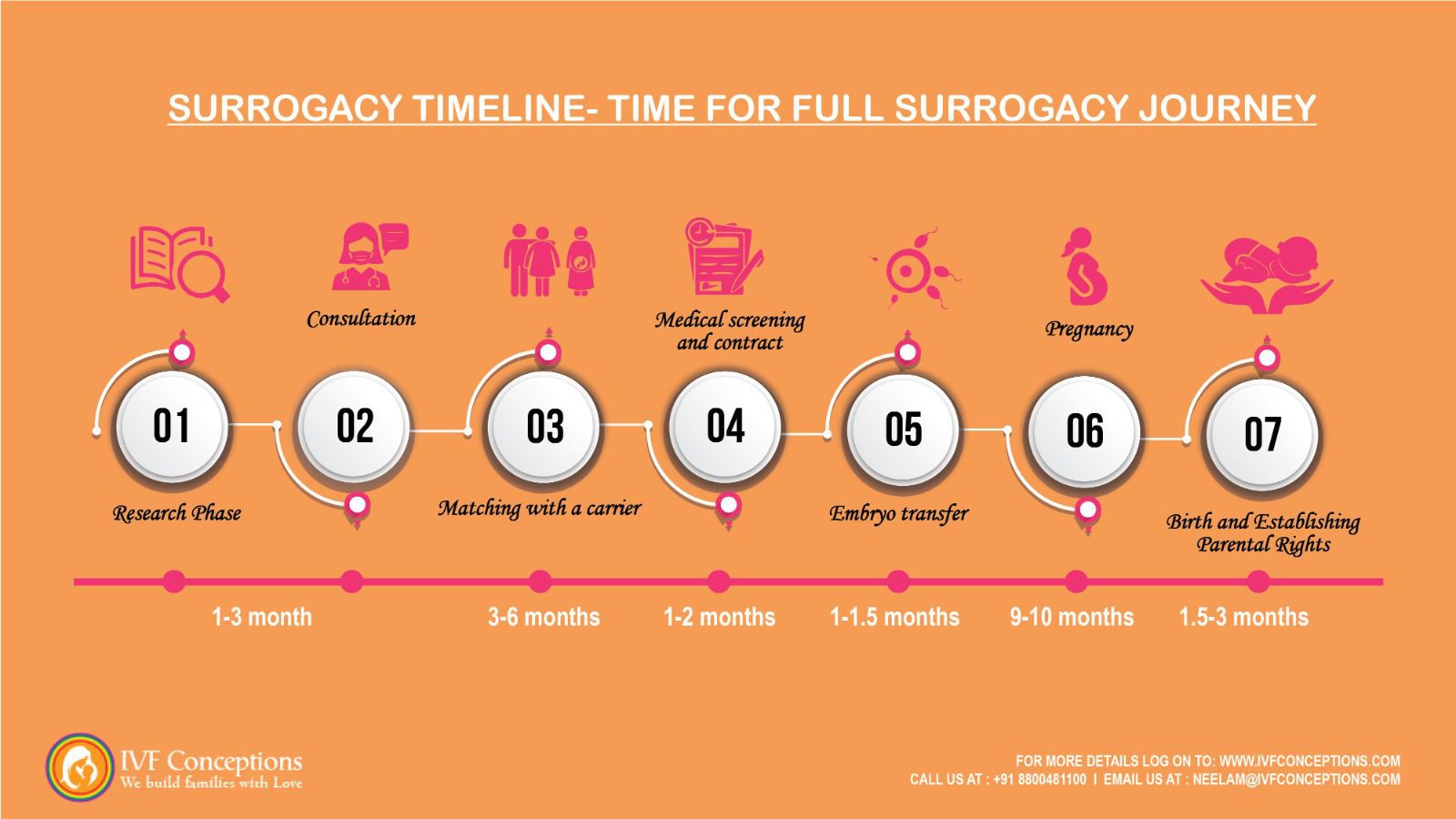Commercial Surrogacy: Complete Guide, Costs, Process & Legalities

Commercial surrogacy is a surrogacy arrangement in which the surrogate mother receives compensation beyond the reimbursement of medical expenses. It offers a unique path to parenthood for individuals and couples who are unable to conceive or carry a pregnancy.
In this comprehensive guide, we will cover what is commercial surrogacy and explore its key aspects like ethical considerations, legal landscape, and pros and cons associated with this form of assisted reproduction.
There is no accurate data on how many kids are born every year through surrogacy. However, in 2012, the surrogacy industry was valued at around $6 Billion, although the real value can be much higher than what is estimated.
Get in touch for a Free Surrogacy Consultancy:
📲 +91-8800481100 ( WhatsApp, Line, Viber)
Surrogacy costs resources worldwide:
Top 4 cheapest countries for surrogacy
Best Countries for Surrogacy 2023- Top International Destinations
Risks of international surrogacy
Global International Surrogacy Options
Surrogacy In Mexico-Everything Intended Parents Need To Know
Cheapest Country For Gay Surrogacy- Colombia
Low-cost surrogate mother in Argentina
Low-cost surrogate mother in Kazakhstan

What is Commercial Surrogacy?
Women who are unable to conceive, due to any reason, seek the help of willing surrogate mothers. Furthermore, the intended parents implant their biological embryos through a medical procedure of the Assisted Reproduction Technique (ART) – IVF process. There are different types of surrogacy.
Commercial surrogacy is a form of surrogacy where the surrogate is financially compensated for carrying and delivering the child for the intended parents. This is in contrast to altruistic surrogacy, where the surrogate only receives reimbursement for medical and related expenses but does not earn additional financial compensation.
In commercial surrogacy:
- The surrogate agrees to carry the baby in exchange for a fee.
- Intended parents cover the costs associated with IVF, pregnancy, and legal expenses, along with the surrogate’s compensation.
- The legal framework surrounding commercial surrogacy varies greatly from country to country, with some nations allowing it under strict regulations, while others ban it entirely.
Commercial surrogacy refers to an arrangement in which the surrogate mother is compensated for her services with a predetermined fee known as “surrogate compensation,” which is beyond reimbursement of medical expenses. Commercial surrogacy is legal in countries like Ukraine, Georgia, and the USA (a few states).
Why Choose Commercial Surrogacy?
Commercial surrogacy offers a viable solution for intended parents who cannot conceive or carry a child due to:
- Infertility: Couples or individuals facing infertility issues often turn to surrogacy after exhausting other fertility treatments.
- Medical Reasons: Women with medical conditions that make pregnancy risky or impossible may opt for surrogacy.
- Same-Sex Couples: Surrogacy provides a pathway to parenthood for male same-sex couples and single men.
- Single Parents: Surrogacy offers a solution for single parents who want to have a biological child.

Commercial Surrogacy Process: Step-by-Step
The surrogacy process involves several key stages that intended parents need to navigate carefully. Here’s a step-by-step guide:
1. Deciding on Surrogacy
The first step is for the intended parents to decide if surrogacy is the right option for them. Factors to consider include health, finances, and the emotional commitment required throughout the process.
2. Choosing a Surrogacy Agency
Surrogacy agencies provide crucial support by matching intended parents with surrogates, managing legal paperwork, coordinating medical appointments, and offering counseling services. It’s essential to select an agency with a good reputation and success rate.
3. Matching with a Surrogate
The agency will match the intended parents with a surrogate based on compatibility, health criteria, and legal considerations. The surrogate goes through extensive medical and psychological screenings to ensure she is fit for the process.
4. Legal Contracts
Before any medical procedures, legal contracts must be drafted and signed. This ensures that both the intended parents and the surrogate understand their rights and responsibilities, including surrogate compensation, medical expenses, and the intended parents’ rights to the child after birth.
5. In Vitro Fertilization (IVF)
The IVF process involves stimulating the intended mother or egg donor’s ovaries to produce eggs, which are then retrieved and fertilized with the intended father’s sperm or a sperm donor. The resulting embryos are transferred into the surrogate’s uterus for implantation.
6. Pregnancy and Monitoring
Once the surrogate becomes pregnant, regular medical checkups and prenatal care are conducted. The intended parents may choose to participate in milestones such as ultrasound appointments and pregnancy updates.
7. Birth and Legal Finalization
After the child is born, the intended parents typically take legal custody. Depending on the country, the finalization of parental rights may involve additional court processes, especially for international surrogacy arrangements.
What is the difference between commercial and altruistic surrogacy?
Commercial surrogacy involves a predetermined monetary benefit for the services provided by the surrogate mother. On the other hand, altruistic surrogacy means that other than covering the medical expenses, the intended parents do not have to pay anything more to the surrogate mother.
Typically, altruistic surrogacies are between close friends or family members. For instance, when a woman offers to carry a pregnancy for her friend or sibling without compensation. But, if you are locating a surrogate through a surrogacy professional, your surrogacy is most likely to be a commercial one.
There has been a lot of controversies and debates over the ethical relevance of commercial surrogacy.
Some critics feel that it takes advantage of vulnerable women, commoditizes human life, and exploits the system of reproduction. However, advocates of surrogacy argue that it is not fair for a woman to carry a baby to term for someone else and receive nothing in return.
While the debate is still ongoing, gestational surrogacy processes have helped several single parents, infertile childless couples, and members of the LGBT community to expand their families.
 What is the cost of commercial surrogacy?
What is the cost of commercial surrogacy?
Each surrogacy journey is different, and therefore, the gestational surrogacy costs vary depending upon the types of surrogacy, the country of surrogacy, and what services are included in the surrogacy packages.
But, one thing is for certain surrogacy costs are much higher in the USA as compared to international surrogacy countries like Georiga, Ukraine, and Mexico.
The average cost of surrogacy in the USA lies in the range of $130,000 to $175,000.
On the other hand, in eastern European countries like Ukraine and Georgia, the surrogacy cost is much lower. Currently, Mexico and Colombia have become one of the cheapest surrogacy countries for gay couples and hetero couples.
Cost of Commercial Surrogacy
The cost of commercial surrogacy varies depending on factors such as the country, medical requirements, legal fees, and surrogate compensation. Here is a detailed breakdown of the common expenses:
|
Cost Category |
Range (in USD) |
Description |
|
Surrogate Compensation |
$30,000 – $60,000 |
Payment to the surrogate for carrying the baby. |
|
IVF Procedures |
$10,000 – $20,000 |
Fertility treatments, egg retrieval, embryo transfer. |
|
Medical Screening & Testing |
$2,000 – $5,000 |
Medical screening for both intended parents and surrogate. |
|
Agency Fees |
$15,000 – $30,000 |
Fee for agency services, including matching, coordination, and support. |
|
Legal Fees |
$10,000 – $15,000 |
Legal contracts, parental rights, and court proceedings. |
|
Surrogate Prenatal Care |
$3,000 – $7,000 |
Medical care and checkups during pregnancy. |
|
Insurance |
$5,000 – $10,000 |
Maternity insurance or health coverage for the surrogate. |
|
Miscellaneous Expenses |
$5,000 – $10,000 |
Travel, accommodation, and additional medical costs. |
|
Total Cost |
$80,000 – $150,000 |
Total cost range for commercial surrogacy. |
Commercial Surrogacy Costs by Country
|
Country |
Cost (in USD) |
Legal Status |
Surrogacy Type Allowed |
|
United States |
$100,000 – $150,000 |
Legal, varies by state |
Commercial and altruistic |
|
Ukraine |
$40,000 – $70,000 |
Legal for married heterosexual couples |
Commercial surrogacy |
|
Georgia |
$50,000 – $60,000 |
Legal for married heterosexual couples |
Commercial surrogacy |
|
India |
Banned for foreigners |
Illegal for foreigners, allowed for locals |
Altruistic only for locals |
|
Mexico |
$45,000 – $65,000 |
Legal, varies by state |
Commercial surrogacy |
|
Colombia |
$60,000 – $80,000 |
Legal, favorable for foreigners |
Commercial surrogacy |
Read more:
Top 4 cheapest countries for commercial surrogacy
Risk of international surrogacy
Which are legal international surrogacy countries
Exploring the Ethics of Commercial Surrogacy
The ethics of surrogacy have been the subject of intense debate. Critics argue that it may exploit vulnerable women, commodify human life, and raise concerns about the ethics of reproductive practices. On the other hand, proponents argue that it allows women to be fairly compensated for their commitment and sacrifices, providing a regulated framework to protect the rights of all parties involved. By examining these ethical considerations, intended parents can make informed decisions.
Countries where commercial surrogacy is allowed
So, the next question is where is commercial surrogacy legal? Some of the countries that allow commercial surrogacy are the USA, Georgia, Mexico, and Ukraine.
All forms of surrogacy are banned by countries like Germany, France, Spain, Italy, Bulgaria, and Portugal. In countries including Ireland, the UK, Belgium, and Denmark, surrogacy is allowed in which the surrogate is not paid or just paid for reasonable expenses, such as medical expenses.
Legal Considerations for Commercial Surrogacy
The legal landscape of l surrogacy varies across countries and jurisdictions. While some nations have banned or restricted commercial surrogacy, others have well-defined laws to regulate the practice.
Intended parents need to understand the legal aspects in their specific region to ensure compliance and protect their rights. Navigating the legal complexities with the assistance of experienced professionals is crucial for a successful surrogacy journey.
Legalities of Commercial Surrogacy
The legal landscape surrounding commercial surrogacy varies significantly around the world. It’s important for intended parents to understand the laws in their own country as well as the country where the surrogacy is taking place. Below are some key legal aspects to consider:
1. Contracts
- Surrogacy agreements are critical in defining the rights and responsibilities of both the intended parents and the surrogate. These contracts must clearly outline financial terms, medical obligations, and custody arrangements.
- Contracts are essential to ensure that the intended parents are recognized as the legal parents of the child.
2. Parental Rights
- In countries where commercial surrogacy is legal, the intended parents are usually granted full parental rights at birth. However, in some jurisdictions, intended parents may need to go through an adoption process or court order to finalize their parental rights.
- For international surrogacy, intended parents must follow the legal procedures of both their home country and the country where the surrogacy occurs to secure parental rights.
3. Restrictions by Country
- United States: Commercial surrogacy laws vary from state to state. States like California are very surrogacy-friendly, while others like Michigan prohibit it.
- Ukraine and Georgia: These countries allow commercial surrogacy for married heterosexual couples, offering strong legal frameworks that protect both surrogates and intended parents.
- India and Thailand: Once popular destinations for international surrogacy, these countries now ban commercial surrogacy for foreigners due to ethical concerns and exploitation risks.
- Mexico: Surrogacy is allowed in some states, such as Tabasco, but intended parents should ensure that they are following the specific legal guidelines of the region.
International commercial surrogacy
It is legal in some states of the US, namely, California, New Hampshire, Oregon, Washington D.C., Arkansas, Maryland, Illinois, Washington State, and New Jersey.
In Georgia, Ukraine, and Mexico commercial surrogacy is allowed. Thus, making them new hotspots for infertile couples who are ready to pay for foreign wombs to have their children gestated.
More resources for Surrogacy options for international intended parents:
All about surrogacy in Ukraine
All about surrogacy in Georiga
 Pros and Cons of Commercial Surrogacy
Pros and Cons of Commercial Surrogacy
Consideration of the advantages and disadvantages of commercial surrogacy is vital for intended parents.
Pros
- Fair compensation for surrogate mothers,
- Legal regulation ensuring the rights of all parties involved,
- availability of professional agencies
Cons
- Higher surrogacy costs for all types of surrogacy journeys
- Sometimes no explicit legal framework
- Concerns of exploitation for both surrogate mothers and intended parents.
Pros and Cons of Commercial Surrogacy
|
Pros |
Cons |
|
Higher Success Rates |
High Costs: Commercial surrogacy can be expensive. |
|
Compensation for Surrogates |
Legal Complexities: Legal hurdles vary by country. |
|
More Surrogates Available |
Ethical Concerns: Some question the ethics of paid surrogacy. |
|
Well-Regulated |
Not Allowed Everywhere: Banned or restricted in many countries. |
Making Informed Decisions about Commercial Surrogacy
Commercial surrogacy offers a path to parenthood for many individuals and couples, but it requires careful consideration of the costs, legalities, and ethical aspects involved. Countries like the United States, Ukraine, and Georgia provide structured environments for commercial surrogacy, while others impose strict restrictions or outright bans.
Engaging with experienced professionals in countries or states with clear surrogacy laws ensures that the process is conducted legally and ethically.
Additional Guides for Surrogate Mother:
Find a Surrogate Mother With or Without an Agency
In Which Country I Find Low-Cost Surrogate Mothers (in 2023)?
How can I Find a Surrogate Without Agency
What is the Age Limit for Surrogate Mothers
How Much Does Surrogacy Cost Using Family Member
How to Start the Gestational Surrogacy Process? A step-by-step guide for Beginners
How Much Does Surrogacy Cost? Everything You Need To Know (in 2023)
Conclusion
To sum up, surrogacy can be an excellent way of making families for infertile couples if it is done ethically and legally. This option of becoming parents should be given to all despite their marital status, sexual inclination, or financial capacity.
By understanding the key aspects, ethical considerations, and legal landscape, and weighing the pros and cons, individuals and couples can make informed decisions about pursuing commercial surrogacy. With the guidance of professionals, they can navigate the journey with confidence, knowing that their rights and the well-being of surrogate mothers are respected and protected.
To make your surrogacy parenthood journey a hassle-free experience, it is good to follow a few tips:
- Intended parents concerned with the legal implications, must work with an experienced professional in a country, where there are secure surrogacy laws.
- It is vital to make sure that the surrogate mother is treated well and rightly compensated for her womb service.
- The incredibly high surrogacy cost in legal surrogacy countries makes prospective intended parents fall for low-cost surrogacy in risky countries like Kenya, Ghana, or Laos, where surrogacy is not regulated. Such a destination can be lucrative but, most intended parents end up having a myriad of legal issues later.
- Go for countries, where gestational surrogacy is legally allowed and secure. Countries like Ukraine, Georgia, and Mexico offer the cheapest commercial surrogacy country but at the same time have explicit surrogacy legislation in place.
- Surrogacy for gay couples is more costly and complicated than for straight couples. They have fewer surrogacy options that offer safe and affordable surrogacy. If you have a lot of money, you can opt for surrogacy in the USA, California. The other best option would be gay surrogacy in Colombia and LGBT surrogacy in Mexico.
If you’d like to learn more about IVF, Egg Donation, or surrogacy services globally, check out the rest of our website at IVF Conceptions. We offer legally secure and affordable surrogacy services to build families with love.
Get in touch for a Free Surrogacy Consultancy:
📲 +91-8800481100 ( WhatsApp, Line, Viber)
 FAQs About What is Commercial Surrogacy?
FAQs About What is Commercial Surrogacy?
Commercial surrogacy is a form of surrogacy in which a woman, known as the surrogate or gestational carrier, carries a pregnancy and gives birth to a child for intended parents who are unable to conceive or carry a pregnancy themselves. In commercial surrogacy, the surrogate is usually compensated financially for her services, in addition to having her medical expenses covered.
The average cost of surrogacy in the USA is $150,000 and above. The cost of commercial surrogacy can vary significantly depending on various factors such as the location, agency or clinic fees, legal fees, medical expenses, and the specific requirements of the intended parents.
The legal requirements for commercial surrogacy vary from country to country and even within different jurisdictions. Some countries have specific laws that regulate and allow commercial surrogacy, while others may prohibit it altogether or have restrictions in place. The USA, Georgia, and Ukraine offer commercial surrogacy, but UK, Australia, and Canada, only allow altruistic surrogacy.
Yes, same-sex couples can certainly opt for commercial surrogacy. In many countries where commercial surrogacy is legal, there are no specific restrictions based on sexual orientation like the USA. However, some other countries like Georgia and Ukraine do not allow same-sex surrogacy.
Commercial surrogacy, like any medical procedure, carries potential risks and complications. These can include physical risks associated with pregnancy and childbirth, such as gestational diabetes, preeclampsia, and cesarean section delivery. There can also be psychological and emotional risks for both the surrogate and the intended parents, as the process can be emotionally challenging and may involve complex relationships.
The duration of the commercial surrogacy process can vary depending on several factors, including the legal requirements, availability of egg donors, surrogates, and individual circumstances. On average, the process can take 15 months to 24 months.
The rights of surrogates in commercial surrogacy can differ depending on the legal framework of the jurisdiction involved. In some countries, the legal agreements between the surrogate and the intended parents are made in advance and it is clear from the beginning that the surrogate does not have any right over the baby.
References Used:


 What is the cost of commercial surrogacy?
What is the cost of commercial surrogacy?
 Pros and Cons of Commercial Surrogacy
Pros and Cons of Commercial Surrogacy FAQs About What is Commercial Surrogacy?
FAQs About What is Commercial Surrogacy?